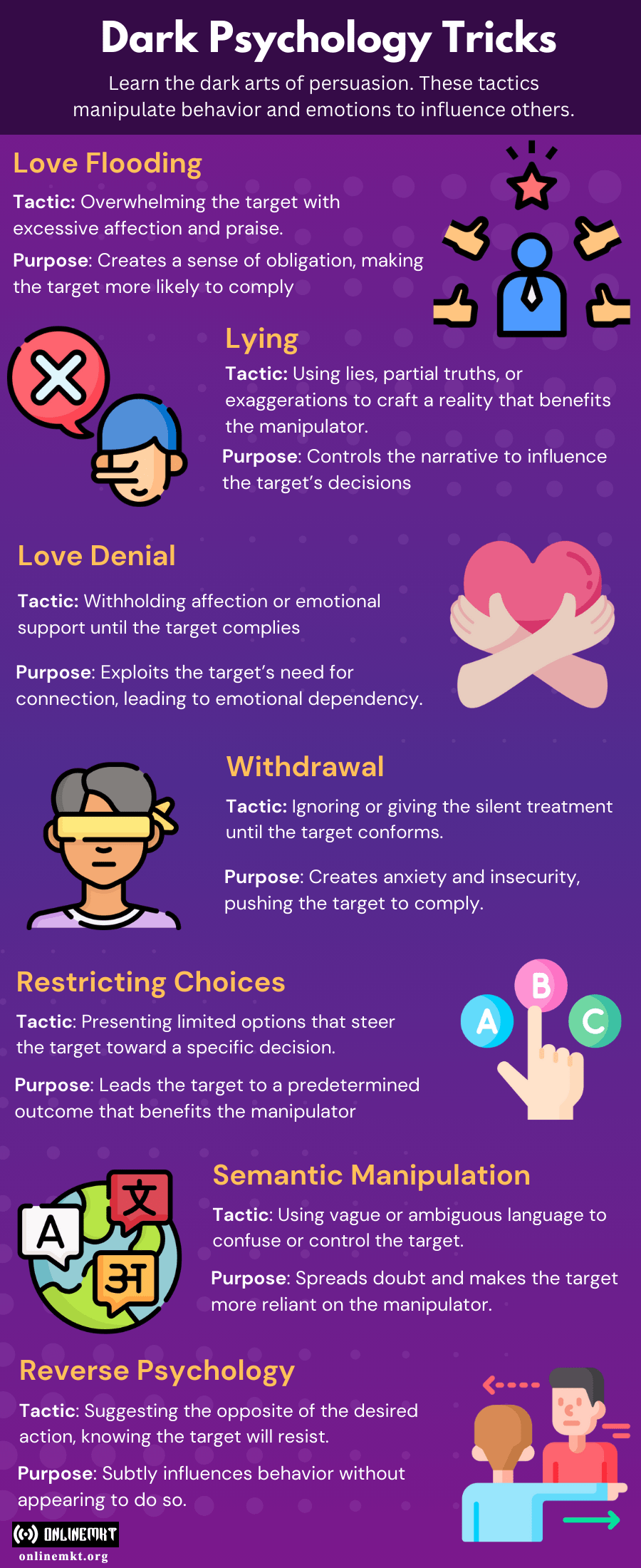Dark Psychology

You think you know the people around you? Think again.
Have you ever wondered why some people seem to have an uncanny ability to influence and manipulate others? The answer might lie in the intriguing world of dark psychology.
Prepare to be captivated, surprised, and perhaps even a little unsettled as we explore the hidden mechanisms that drive dark psychological manipulation.
In this blog, we will explore this shadowy side of human behavior, where certain individuals exploit the weaknesses of others for their own gain.
Dark Psychology Tricks

Love Flooding
Love flooding is a tactic where the manipulator overwhelms the target with excessive affection, compliments, or praise. This barrage of positive attention creates a sense of obligation or indebtedness in the target, making them more likely to comply with the manipulator’s wishes.
For example, if you need help moving furniture, you might lavish someone with praise, making them feel valued and appreciated, which increases the likelihood that they’ll assist you. In more extreme cases, a manipulator might create a deep emotional bond, leading the target to do things they wouldn’t normally consider, all in the name of preserving that relationship.
Lying
Lying is a fundamental tactic in dark psychology, but it’s not just about telling outright falsehoods. Manipulators often use lies to craft a version of reality that benefits them. This could involve telling partial truths, exaggerating certain aspects of a story, or fabricating an entire scenario. The goal is to control the narrative in a way that influences the target’s perceptions and decisions.
For instance, a manipulator might lie about their intentions or circumstances to gain sympathy, trust, or support from others.
Love Denial
Love denial is a manipulative tactic that involves withholding affection, attention, or emotional support until the target complies with the manipulator’s demands. This form of emotional blackmail can be incredibly distressing for the victim, as it plays on the natural human need for connection and approval.
The manipulator might suddenly withdraw their warmth and affection, leaving the victim feeling isolated, abandoned, and desperate to win back the manipulator’s favor. This tactic can be especially powerful in close relationships, where the victim’s emotional dependency makes them more susceptible to such manipulation.
Withdrawal
Withdrawal is similar to love denial but can be even more insidious. It involves the manipulator giving the target the silent treatment, ignoring them, or refusing to engage until the target conforms to their wishes.
This tactic is designed to create a sense of anxiety and insecurity in the victim, as they are left wondering what they did wrong and what they need to do to regain the manipulator’s attention. The emotional distress caused by this isolation can push the victim to comply with the manipulator’s demands, simply to end the painful silence.
Restricting Choices
Restricting choices is a tactic where the manipulator presents the target with a limited set of options, steering them towards a decision that benefits the manipulator. While it may seem like the target has free will, the reality is that the choices have been carefully curated to lead to a predetermined outcome.
For instance, a manipulator might offer several seemingly reasonable options but deliberately omit the one choice that would be most beneficial to the target. This tactic can be particularly effective in negotiations, sales, or any situation where decision-making is involved.
Semantic Manipulation
Semantic manipulation involves the strategic use of language to confuse, mislead, or control the target. The manipulator might use words or phrases that seem clear and mutually understood but then twist their meaning later on, causing the target to doubt their understanding of the situation.
For example, a manipulator might use vague terms or ambiguous language in a conversation, then later claim that they meant something entirely different. This tactic sows confusion and uncertainty, making the target more reliant on the manipulator for clarification and direction.
Reverse Psychology
Reverse psychology is a tactic where the manipulator suggests a course of action that they actually want the target to avoid, knowing that the target will likely do the opposite. This tactic plays on the human tendency to resist being controlled or told what to do.
For instance, if a manipulator wants someone to choose a particular option, they might suggest that the person does the opposite, fully expecting that the person will reject the suggestion and choose the intended option instead. It’s a subtle but effective way to influence behavior without appearing to do so.
Who Uses Dark Psychology Tricks?
These dark tactics can be used by various people in different aspects of life. It’s essential to recognize and understand these methods to protect yourself.
Narcissists
Narcissists have an inflated sense of self-worth and a need to prove their superiority. They often use dark psychology to manipulate others into admiring and respecting them.
Sociopaths
Sociopaths are often charming, intelligent, and persuasive. They use these traits not to connect emotionally but to achieve their goals. Without the ability to feel guilt, they have no qualms about employing dark psychology to form shallow, self-serving relationships.
Politicians
Some politicians may use dark psychology to sway voters, convincing them that their stance on an issue is the best, even if it’s not entirely truthful.
Salespeople
While many salespeople operate ethically, some might use manipulative tactics, particularly those who consistently hit high sales targets. They know how to push the right buttons to close a deal.
Leaders
Throughout history, many leaders have used dark psychology to persuade their followers, employees, or citizens to support their agendas, often prioritizing personal gain over collective good.
Selfish Individuals
These are people who prioritize their own needs over others, often at others’ expense. They use dark psychology to ensure that if anyone loses in a situation, it won’t be them.
Dark Psychology in Social Persuasion and Manipulation
Some people equate persuasion with manipulation, but there’s a significant difference. The key lies in the ethical and moral foundations of each.
Persuasion can be a positive force, intended to influence others without causing harm. Manipulation, on the other hand, is inherently self-serving and often damaging. Those who manipulate don’t care about the well-being of their targets – they’re focused solely on achieving their own goals, regardless of the harm they cause.
Understanding this distinction is crucial to grasp how dark psychology operates. While dark psychology can sometimes blend into persuasion, it leans heavily toward manipulation, often resulting in long-lasting negative effects on the victim.
Conclusion
Dark psychology is a powerful tool that, when used correctly, can even have positive impacts. However, it is more often associated with manipulation than with constructive influence. The techniques discussed here show just how potent and dangerous – these tactics can be in the hands of someone intent on exploiting others. By learning to recognize these strategies, you can protect yourself and others from falling prey to the darker side of human nature.